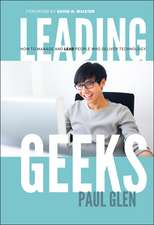Optimal Inventory Modeling of Systems: Multi-Echelon Techniques: International Series in Operations Research & Management Science, cartea 72
Autor Craig C. Sherbrookeen Limba Engleză Paperback – 26 apr 2013
Although only four chapters and appendices are totally new in this edition, extensive revisions have been made in all chapters, adding numerous worked-out examples. Many new applications have been added including commercial airlines, experience gained during Desert Storm, and adoption of the Windows interface as a standard for personal computer models.
| Toate formatele și edițiile | Preț | Express |
|---|---|---|
| Paperback (1) | 1707.96 lei 6-8 săpt. | |
| Springer Us – 26 apr 2013 | 1707.96 lei 6-8 săpt. | |
| Hardback (1) | 1712.70 lei 6-8 săpt. | |
| Springer Us – 30 apr 2004 | 1712.70 lei 6-8 săpt. |
Din seria International Series in Operations Research & Management Science
- 20%
 Preț: 331.25 lei
Preț: 331.25 lei - 9%
 Preț: 696.06 lei
Preț: 696.06 lei - 20%
 Preț: 570.62 lei
Preț: 570.62 lei - 18%
 Preț: 1132.02 lei
Preț: 1132.02 lei - 18%
 Preț: 773.72 lei
Preț: 773.72 lei -
 Preț: 170.40 lei
Preț: 170.40 lei - 17%
 Preț: 459.35 lei
Preț: 459.35 lei - 17%
 Preț: 360.48 lei
Preț: 360.48 lei -
 Preț: 263.40 lei
Preț: 263.40 lei - 24%
 Preț: 905.31 lei
Preț: 905.31 lei - 17%
 Preț: 460.09 lei
Preț: 460.09 lei - 17%
 Preț: 459.35 lei
Preț: 459.35 lei - 20%
 Preț: 631.58 lei
Preț: 631.58 lei - 13%
 Preț: 480.01 lei
Preț: 480.01 lei - 18%
 Preț: 738.28 lei
Preț: 738.28 lei - 18%
 Preț: 1225.94 lei
Preț: 1225.94 lei - 18%
 Preț: 948.92 lei
Preț: 948.92 lei - 18%
 Preț: 703.88 lei
Preț: 703.88 lei - 18%
 Preț: 957.44 lei
Preț: 957.44 lei - 15%
 Preț: 651.84 lei
Preț: 651.84 lei - 20%
 Preț: 336.21 lei
Preț: 336.21 lei - 15%
 Preț: 641.03 lei
Preț: 641.03 lei -
 Preț: 404.29 lei
Preț: 404.29 lei - 18%
 Preț: 950.21 lei
Preț: 950.21 lei - 15%
 Preț: 649.06 lei
Preț: 649.06 lei - 18%
 Preț: 725.75 lei
Preț: 725.75 lei -
 Preț: 394.12 lei
Preț: 394.12 lei - 18%
 Preț: 951.47 lei
Preț: 951.47 lei - 15%
 Preț: 639.59 lei
Preț: 639.59 lei - 18%
 Preț: 773.06 lei
Preț: 773.06 lei - 18%
 Preț: 889.29 lei
Preț: 889.29 lei - 15%
 Preț: 655.60 lei
Preț: 655.60 lei - 15%
 Preț: 640.06 lei
Preț: 640.06 lei
Preț: 1707.96 lei
Preț vechi: 2082.89 lei
-18% Nou
Puncte Express: 2562
Preț estimativ în valută:
326.92€ • 355.23$ • 274.79£
326.92€ • 355.23$ • 274.79£
Carte tipărită la comandă
Livrare economică 21 aprilie-05 mai
Preluare comenzi: 021 569.72.76
Specificații
ISBN-13: 9781475788518
ISBN-10: 1475788517
Pagini: 432
Ilustrații: XXX, 392 p.
Dimensiuni: 155 x 235 x 23 mm
Greutate: 0.6 kg
Ediția:2nd ed. 2004. Softcover reprint of the original 2nd ed. 2004
Editura: Springer Us
Colecția Springer
Seria International Series in Operations Research & Management Science
Locul publicării:New York, NY, United States
ISBN-10: 1475788517
Pagini: 432
Ilustrații: XXX, 392 p.
Dimensiuni: 155 x 235 x 23 mm
Greutate: 0.6 kg
Ediția:2nd ed. 2004. Softcover reprint of the original 2nd ed. 2004
Editura: Springer Us
Colecția Springer
Seria International Series in Operations Research & Management Science
Locul publicării:New York, NY, United States
Public țintă
ResearchCuprins
Single-Site Inventory Model for Repairable Items.- Metric: A Multi-Echelon Model.- Demand Processes and Demand Prediction.- Vari-Metric: A Multi-Echelon, Multi-Indenture Model.- Multi-Echelon, Multi-Indenture Models With Periodic Supply And Redundancy.- Special Topics in Periodic Supply.- Modeling of Cannibalization.- Applications.- Implementation Issues.- Erratum.
Recenzii
About the first edition:
"This book is a remarkable review and summary of nearly 30 years work on applied inventory theory. The book is a model of clarity and coherence. Even those concerned with other problem domains may benefit from the distilled wisdom it offers."
(Interfaces - Professor Steve New, University of Manchester)
"A large number of solved numerical examples help with the understanding of the models and mathematics used. Undoubtedly, a book of such integrity deserves a place on the shelf of any person, library or organization whose interests lie in the domain of inventory theory and its application to complex systems."
(Logistics Spectrum - Professor Mirce Knezevic, Exeter University)
About the second edition:
"In the second edition, the basics remain the same and should be considered essential knowledge for logisticians and system managers. Sherbrooke has spent his career solving real inventory problems. Practical examples help the reader understand critical concepts like marginal analysis, expected backorders, cost-availability curves, optimization, and analytical versus simulation based models. In Optimal Inventory Modeling of Systems, Sherbrooke tells us how we (public and private sector managers) can better understand and act on the critical trade-offs between cost and system availability. This reference text should be on your bookshelf."
(George T. Babbitt, General, USAF (Retired), Formerly Commander, Air Force Material Command; Director, Defense Logistics Agency)
"This book is a remarkable review and summary of nearly 30 years work on applied inventory theory. The book is a model of clarity and coherence. Even those concerned with other problem domains may benefit from the distilled wisdom it offers."
(Interfaces - Professor Steve New, University of Manchester)
"A large number of solved numerical examples help with the understanding of the models and mathematics used. Undoubtedly, a book of such integrity deserves a place on the shelf of any person, library or organization whose interests lie in the domain of inventory theory and its application to complex systems."
(Logistics Spectrum - Professor Mirce Knezevic, Exeter University)
About the second edition:
"In the second edition, the basics remain the same and should be considered essential knowledge for logisticians and system managers. Sherbrooke has spent his career solving real inventory problems. Practical examples help the reader understand critical concepts like marginal analysis, expected backorders, cost-availability curves, optimization, and analytical versus simulation based models. In Optimal Inventory Modeling of Systems, Sherbrooke tells us how we (public and private sector managers) can better understand and act on the critical trade-offs between cost and system availability. This reference text should be on your bookshelf."
(George T. Babbitt, General, USAF (Retired), Formerly Commander, Air Force Material Command; Director, Defense Logistics Agency)
Textul de pe ultima copertă
Most books on inventory theory use the item approach to determine stock levels, ignoring the impact of unit cost, echelon location, and hardware indenture. Optimal Inventory Modeling of Systems is the first book to take the system approach to inventory modeling. The result has been dramatic reductions in the resources to operate many systems - fleets of aircraft, ships, telecommunications networks, electric utilities, and the space station.
Although only four chapters and appendices are totally new in this edition, extensive revisions have been made in all chapters, adding numerous worked-out examples. Many new applications have been added including commercial airlines, experience gained during Desert Storm, and adoption of the Windows interface as a standard for personal computer models.
Book Reviews of the first edition
"This book is a remarkable review and summary of nearly 30 years work on applied inventory theory. The book is a model of clarity and coherence. Even those concerned with other problem domains may benefit from the distilled wisdom it offers." Interfaces – Professor Steve New, University of Manchester
"A large number of solved numerical examples help with the understanding of the models and mathematics used. Undoubtedly, a book of such integrity deserves a place on the shelf of any person, library or organization whose interests lie in the domain of inventory theory and its application to complex systems." Logistics Spectrum – Professor Mirce Knezevic, Exeter University
Book Review of the second edition
"In the second edition, the basics remain the same and should be considered essential knowledge for logisticians and system managers. Sherbrooke has spent his career solving real inventory problems. Practical examples help the reader understand critical concepts like marginal analysis, expected backorders, cost-availability curves,optimization, and analytical versus simulation based models. In Optimal Inventory Modeling of Systems, Sherbrooke tells us how we (public and private sector managers) can better understand and act on the critical trade-offs between cost and system availability. This reference text should be on your bookshelf." George T. Babbitt, General, USAF (Retired), Formerly Commander, Air Force Material Command; Director, Defense Logistics Agency.
Although only four chapters and appendices are totally new in this edition, extensive revisions have been made in all chapters, adding numerous worked-out examples. Many new applications have been added including commercial airlines, experience gained during Desert Storm, and adoption of the Windows interface as a standard for personal computer models.
Book Reviews of the first edition
"This book is a remarkable review and summary of nearly 30 years work on applied inventory theory. The book is a model of clarity and coherence. Even those concerned with other problem domains may benefit from the distilled wisdom it offers." Interfaces – Professor Steve New, University of Manchester
"A large number of solved numerical examples help with the understanding of the models and mathematics used. Undoubtedly, a book of such integrity deserves a place on the shelf of any person, library or organization whose interests lie in the domain of inventory theory and its application to complex systems." Logistics Spectrum – Professor Mirce Knezevic, Exeter University
Book Review of the second edition
"In the second edition, the basics remain the same and should be considered essential knowledge for logisticians and system managers. Sherbrooke has spent his career solving real inventory problems. Practical examples help the reader understand critical concepts like marginal analysis, expected backorders, cost-availability curves,optimization, and analytical versus simulation based models. In Optimal Inventory Modeling of Systems, Sherbrooke tells us how we (public and private sector managers) can better understand and act on the critical trade-offs between cost and system availability. This reference text should be on your bookshelf." George T. Babbitt, General, USAF (Retired), Formerly Commander, Air Force Material Command; Director, Defense Logistics Agency.













